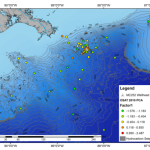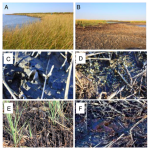Well, the title says it all. As the autumn rolls on, two of the PIs working on our Gulf of Mexico RAPID project are currently headed down to New Orleans for meeting number [insert large number here—I’ve stopped counting] related to the oil spill.
Meetings, meetings, meetings. Apparently if you were one of the lucky ones who got RAPID funding, all that hard-earned grant money is going towards travel expenses—because the organizers certainly aren’t covering our backs.
Unfortunately, there are a bunch of reasons why we MUST attend these meetings:
- It’s the only way to pester and beg NOAA/BP for post-spill samples, since they ignore our 5,000 email requests
- To be the voice for biology, or risk being drowned out by the overwhelming focus on chemical/physical monitoring and analyses. At the meeting in St. Petersburg, NSF told us that they awarded $19.4 million in Deepwater Horizon Rapid grants, yet only $250,000 of this went to study benthic communities (The bulk of the total sum funded instrumentation instead). Yes, it much much harder to measure biological impacts, but they are critically important in the long-term.
Firstly, do these meeting organizers assume we have a magical science fairy who opens her bottomless coffers to pay for all our travel expenses? What really kills me is that NSF has jointly organized a couple of these meetings, and we still have no access to travel funds. Every e-mail we get stresses the importance of academic input, yet seems completely oblivious of how underfunded and time-limited we are as RAPID investigators.
Secondly, the more time I spend talking about and/or begging for samples, the less time I actually spend processing the samples we already have. Less data à less likelihood of renewal funding to study full short/long term impacts of spill à the Gulf of Mexico is screwed. Yes, it is important to meet, talk, and collaborate, but if an organizational science czar was appointed to oversee Deepwater Horizon research three months ago, then we wouldn’t have to blow all our grant money trekking to these repetitive, unfunded meetings.
Sorry if I seem to be whinging, but I think these are valid and lingering concerns for most Deepwater Horizon researchers.
We want to do the best science.
These issues need to be addressed.






How far have the oil contaminants spread through the ocean by now? All the way up north to the East Coast of Canada and South to the East Coast of Argentina to the West Coast of Africa and Europe? With billions of gallons that flowed into the ocean, this must be so, despite the tardy and weak efforts to contain the spillage. If ocean life is poisoned with this oil, will it affect the health of humans who eat oceanic foods as a poison?
Society is a joke after reading your post, especially after I realized that the feel about the Horizon Oil Spill present day, is that “it happened, what’s done is done, I don’t hear that much about it anymore, so it is forgotten until it affects me in a more direct way.” hence my question above.